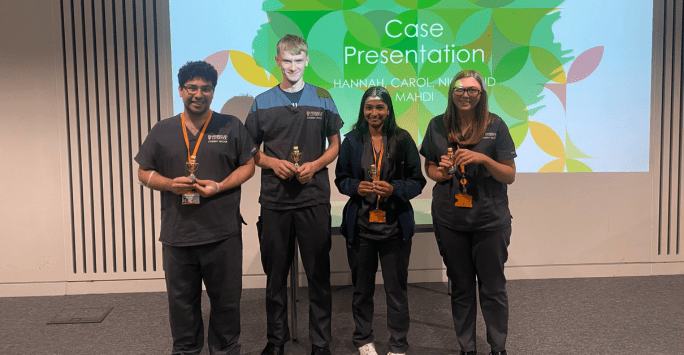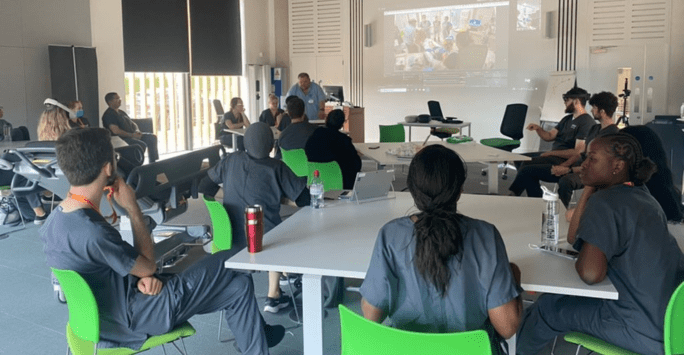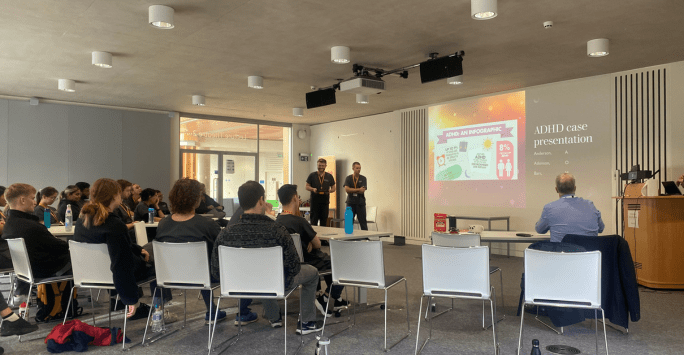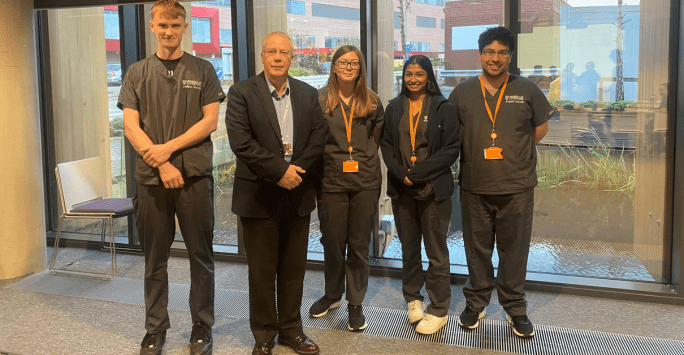Behind the scenes with the Medical Education Team at Alder Hey

One of the most exciting things about studying medicine at Liverpool is the wide range of leading specialist sites that are on our doorstep and which our student doctors take full advantage of during their clinical placements.
Alder Hey Children’s Hospital NHS Foundation Trust is committed to creating a healthier future for children & young people everywhere. This internationally renowned hospital is the tertiary referral centre for children from across Merseyside, Cheshire, parts of Lancashire, Shropshire and North Wales. Through its affiliation with Liverpool School of Medicine, it provides education and training to students in years 3, 4 and 5 of the MBChB programme.
Medical Education Manager Lindsay Brunt lifts the veil on the incredible work that goes on behind the scenes by Alder Hey’s Undergraduate Team to welcome and support student doctors on site, and the ways in which they harness student feedback to drive positive change.
What types of placements does the team manage for Liverpool student doctors?
At Alder Hey we welcome students from Years 3, 4 and 5. When all students are on site this adds up to around 90 students per week.
Year 3 students are attached to our General Paediatric Team for the four-week placement and have the opportunity to attend specialty clinics, shadow on-call doctors and observe in theatres.
In Year 4, students are split into groups of 4 across a variety of specialties including Neurology, Developmental Paediatrics, Endocrinology & Cardiology. The same year, students also complete an ENT placement with our ENT team ran by Mr Adam Donne, in which they rotate on a weekly basis attending a range of theatres, clinics and ward rounds.
For Year 5, students have the option of taking their Selective in Advanced Medical Practice (SAMP) with us, for which they have a dedicated Educational Supervisor and team for the six-week placement.
 Student doctors attend a simulation session at Alder Hey
Student doctors attend a simulation session at Alder Hey
What does this size of operation require?
The management of the timetables starts from as early as July for the next academic year. Once we have received the academic timetable and confirmed the Case-Based Learning (CBL) topics we collect all the teaching dates and send to our consultants and teams to book teaching for the full academic year.
We create a master draft timetable for each cohort and input any fixed items such as A&E Days, theatre sessions, MDTs, Inductions and End of Placement Presentations. Each Educational Supervisor is then contacted to arrange their weekly meetings and bedside teaching and incorporate into the timetable before it’s filled with clinical activity.
Specialty clinics are allocated six weeks before each placement and student timetables are then inputted onto Timetabler, which normally takes 2-3 days depending on the activities required.
How has the implementation of Timetabler enhanced the way you manage students’ schedules?
As a team we find Timetabler has been beneficial for us to use as it is very intuitive. Student timetables are easier to manage and to make changes to, if required.
It’s a lot simpler to check where someone should be and what they’re scheduled for. A real bonus is being able to upload documents onto Timetabler, meaning they are easily accessible, instead of having to go searching through emails or other platforms.
 Students present at the end of their placement
Students present at the end of their placement
How do you collect and build on student feedback?
The School provides us with student evaluation reports and feedback after each placement. We review any concerns raised and transfer them to our Action Tacker. These are then discussed, along with positive feedback of course, during our team meetings with action plans made to address any issues raised.
Student feedback has enabled us to arrange a few new sessions such as weekly meetings with ENT Lead Mr Donne during the ENT placement to talk through the programme and discuss any concerns they may have.
These are really enjoyable sessions that have helped students feel more confident and involved in their learning.
Equally, during paediatrics placements in years 3 and 4, students are invited to a 30-minute catch up session in week 2 where they can raise any queries and identify further opportunities they may wish to explore. It’s also a good chance for us to meet them personally and support them through their four-week timetable.
What aspect of your work do you find most rewarding?
It’s really rewarding for the team when we complete each four-week cycle of timetables and send them out to students in advance of their placement start date. Being organised and able to plan ahead helps give the students the best experience possible during their time with us.
The relationship that is built with students is very important to us. The administration support is all part of the job but creating those connections is the very best aspect.
It’s lovely when students personally thank the team for providing a good experience or support. I’m grateful that the students trust staff and are able to confide in them with personal issues that may affect their placement.
For example, we helped support a student who was coming onto placement following a traumatic experience. Through the support of the School, placement site and the UG team the student finished the four-week placement in a much happier place and left feeling more confident going into their next placement. It was a joy to see them settle into placement and really enjoy their time with us.
 Proud winners at the end of placement presentation
Proud winners at the end of placement presentation
At the end of each placement, students deliver a short presentation in their specialty teams on their experience, including things like their biggest highlights, a game they have played with a child and how it demonstrates developmental abilities, or on a particular clinical case and the impact it had on the young person and family unit.
Students really enjoy these and things can get very competitive with a prize to be won for the best presentation.
The presentations are chaired by our Year Leads, Clinical Sub-Dean or Professor of Child Health and it’s wonderful to see what the students have achieved and how they demonstrate their increased knowledge in paediatrics.
When students return for placements in subsequent years, it’s always nice to be able to welcome them back and see how they have developed.
What advice would you give to a student who is preparing for their first clinical placement?
To always be open, ask questions and don’t ever be embarrassed to contact the UG team. We are here to help and improve your experience. Don’t be afraid to say that you’re struggling or that you’re unsure – everyone is here to help and guide you.
Review your timetable in advance and continue to check for updates on Timetabler. If any queries come up, contact the team. Read emails, get involved, sign in, be punctual, make the most of your time here – the more experiences the better!
Come with an open mind and enthusiasm, immerse yourself in the placement. Take every opportunity that comes your way and make the most of it!
Discover more
- Follow Alder Hey Medical Education on Twitter (link) for more on the training opportunities they provide to undergraduates and postgraduate trainee doctors.
- Dive into the breadth of specialist clinical learning opportunities available at Liverpool School of Medicine on the Why Liverpool? webpage (link).
- Liverpool student doctors can learn more about how their feedback is utilised to continuously optimise the MBChB curriculum and overall student experience on the Student Representation and Feedback section of the student intranet (link).
- See how Timetabler can make managing your placement schedules easier with live update notifications and calendar synching functionality over on the Digital Education webpage (link).